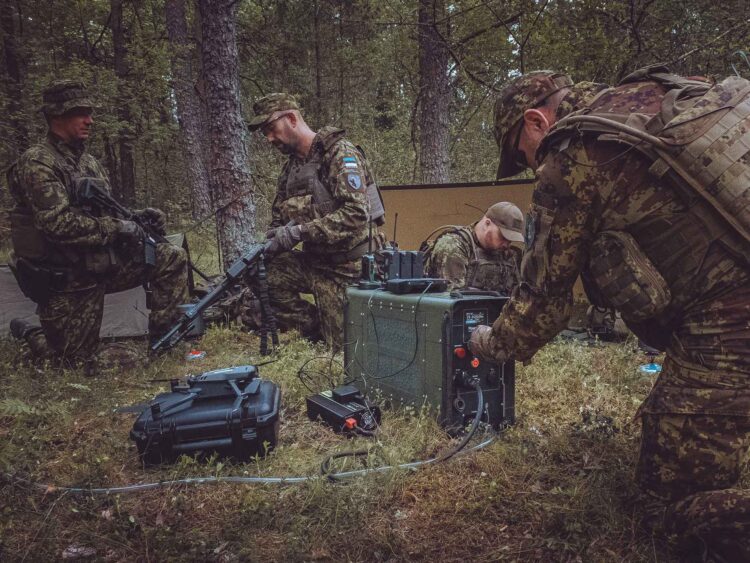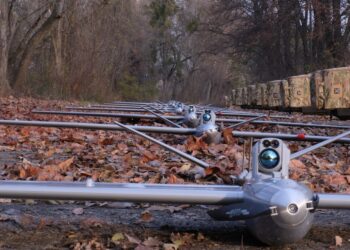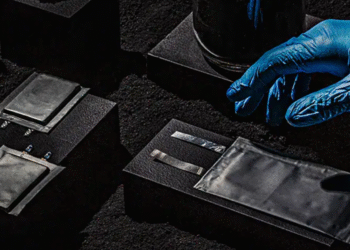Estonian hydrogen dual-use firm PowerUp Energy Technologies has raised a €10 million Series A funding round as it continues to scale the commercialisation of its portable hydrogen-powered electric generators to bring its clean energy solution both to the battlefield and to commercial operations.
The funding for a startup focusing on energy supply comes at a moment when critical infrastructure is in the spotlight. In June 2025, it was estimated that Ukraine had seen at least $20 billion in damage to its energy infrastructure, and given the increasing role that technology is playing on the battlefield, reliable primary and back-up power supplies are become a central concern for fighting and winning in the war against Russia.
PowerUp’s portable hydrogen solution – used both for back-up and primary energy needs – has already made its way to the front lines in Ukraine. As with other suppliers in fields like drones, being used by soldiers in Ukraine has helped to prove PowerUp’s battlefield environment worthiness.
“A small, portable unit, like our 1kW model, weighs less than 25kg and is as quiet as a normal conversation,” founder and CEO Ivar Kruusenberg, told Resilience Media in a guest post earlier this year. The smaller model is capable of powering radios, drones, and medical equipment, “giving small units the energy they need to stay hidden and effective without the noise and heat of a diesel generator.”
PowerUp’s generators differ from fuel-burning generators, in that the fuel cells produce electricity through a chemical reaction between hydrogen and oxygen, with the sole by-products being water and some heat.
“This makes them perfect for modern warfare,” Kruusenberg said. “They’re nearly silent and have a much smaller heat signature, making units far harder for the enemy to find.” Plus, they’re more reliable, he claimed, since they have less components, meaning less possibilities to break down.
”The guys were super happy with it because for the first time they don’t have to play rock, paper, scissors to decide who goes out of the shelter to the forest to fill the diesel generator,” he said in an interview with Resilience Media this week. “Our generators are allowed to be used indoors — the first time a generator [can be used] inside a shelter to charge their eco flow batteries and necessary equipment.” He said the startup is working on a bigger portable generator for Ukrainian troops — a trailer that allows them to produce hydrogen on-site to fill their cylinders. Hydrogen use at the front lines is nothing new, but having the trailer available on the frontlines would extend the existing supply chain.
Mercaton and ScaleWolf are co-leading the investment, with the Green Fund from Estonia’s SmartCap also participating.
The plan is to use the funds to scale PowerUp’s commercial expansion, specifically to expand its sales and technical support teams for new commercial markets in Central Europe and North America.
The funding will also accelerate its R&D process as PowerUp aims to develop higher-density fuel cell models giving it a more diverse range of power options and tailoring.
“PowerUp was founded on a clear mission: to deliver clean, reliable energy solutions,” said Kruusenberg, in a statement. “This capital will directly allow us to expand our network of resellers, distributors and partners in defense and in the commercial sector.”
“At ScaleWolf, we value technologies that strengthen security and resilience where it matters most. PowerUP has shown that its systems can deliver dependable power in demanding environments, supporting both defence missions and essential civilian operations. We are proud to back a team that turns proven performance into meaningful dual-use capability,” said Dave Harden, Partner at ScaleWolf.
PowerUp was founded in Tallinn in 2016 and, including this latest round, has raised around €17 million to-date, per PitchBook data, which includes around €3 million in convertible notes.












